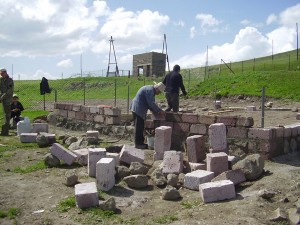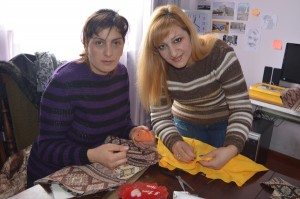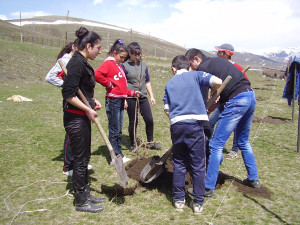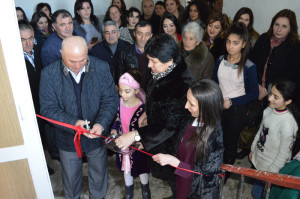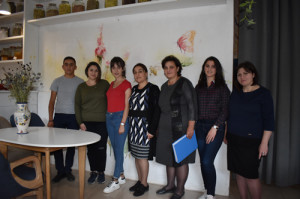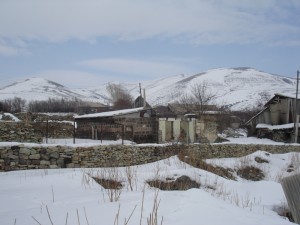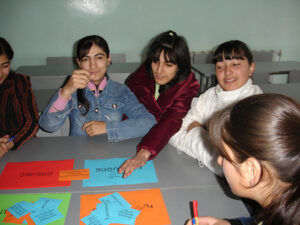The organization’s first steps began with implementation of family planning, healthy lifestyle and HIV/AIDS prevention projects in the rural communities of Shirak province. In 1999-2007, four health care projects were implemented in more than 70 rural communities of the province. In the indicated timeframe, “Healthy Family” centers were established in all beneficiary communities, more than 100 nurses were trained, around 4000 women and girls received information about reproductive health, reproductive rights and family planning, and around 5000 rural women, men and youth obtained basic knowledge on prevention of STDs and HIV/AIDS.
10 years’ experience of working in the rural communities of the province, knowledge of not only health care issues, but also existing social problems triggered the organization to start thinking about developing new approaches of community interventions. Starting from 2008, WFD NGO began its new and structured community development activities in 8 villages of Shirak province.
In the next three years, community centers were established in all target villages, active groups comprised of 10-15 community members were formed and various projects and capacity development trainings were implemented. 3-year strategic community development plans were created for all beneficiary communities, based on the participatory approach, involving village mayors, council members and various community representatives.
In 2008-2016, the organization implemented activities in 12 rural communities of Shirak province, namely Tsoghamarg, Arpeni, Torosgyugh, Bayandur, Krashen, Lanjik, Goghovit, Musayelyan, Hoghmik, Meghrashat, Lernakert, Anushavan (total number of beneficiaries was approximately 8500), and organized its programs based on the «Not for the community, but together with the community” slogan. WFD NGO is not another organization implementing an activity or a project for the community. We are making sure to keep working with various community groups up until the point when they realize and value the necessity of initiating and carrying out a specific project themselves.
WFD NGO conducted trainings in all target communities on the topics of community mobilization and increased participation, civil society, women’s rights, writing competitive project proposals, leadership, conflict management, small business development, and other relevant themes. As the result, active groups were established in the target communities and their members (mostly women and young girls) became involved in the processes of raising community issues and resolving them; they became more self-reliant and were granted the opportunity of raising their voices on local level through implementation of 19 small grants projects. In accordance with the small grants implementation policy, it was mandatory to secure at least 10% of the community contribution for the total budget of each grant amount, which had to come from local administration’s budgets. Fundraising and volunteering were also actively promoted among community population as additional means for securing project funds. This, in turn, played a major role in creating a new culture in our target villages.
One of the achievements of the organization is promotion of women’s entrepreneurship development projects. The previous projects experience has shown that rural women have big potential and in case of having corresponding knowledge and skills they are ready to overcome the stereotypes and start their small business.
In the result of the project implemented in 2017 – 2020 the following progress was registered in 8 target villages:
- – 12 community active groups were established, including 4 youth initiative groups with more than 53 youth involved (26 boys and 27 girls). 109 events and trainings are organized involving more than 300 schoolchildren and youngsters.
- – In total, 52 capacity building trainings were organized for more than 400 community members (women, men and youth).
- – 38 social projects were implemented, which to some extent improved lives of approximately 4000 people, living in the target villages (more than the half of total population).
- – 23 young women and men from 8 target communities participated in business trainings.
- – Small grants were provided to fund 10 business projects, 8 of which are run by women. In the result of the business projects it is expected to ensure at least 3% improvement of the financial situation of target families annually.
- – Community Forum Theater groups were established in 7 target communities, with participation of over 150 schoolchildren. In total, 32 scenarios were developed, which are raising various problems and conflicts existing in the communities. In total, 30 performances and public discussion were organized.
- – Civil society organizations are formed in 2 beneficiary communities.
- – Community foundations are established in 3 beneficiary communities.
However, the biggest achievement of the project for us is the transformation of the environment and creation of a new culture in the target communities. Participatory discussions of the community issues, participatory decision-making processes and their presentation to the local administration bodies, as well as local and international organizations are only the first steps of expressing the newly established culture.

